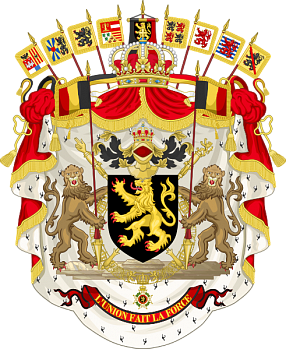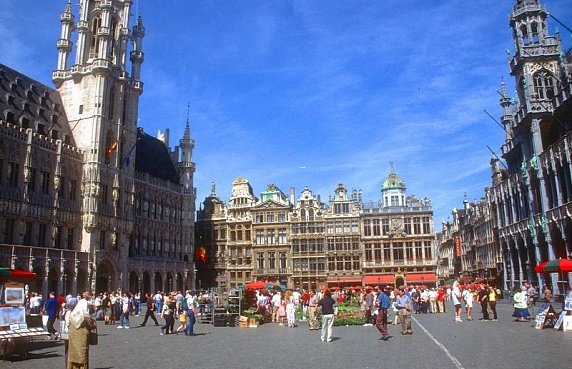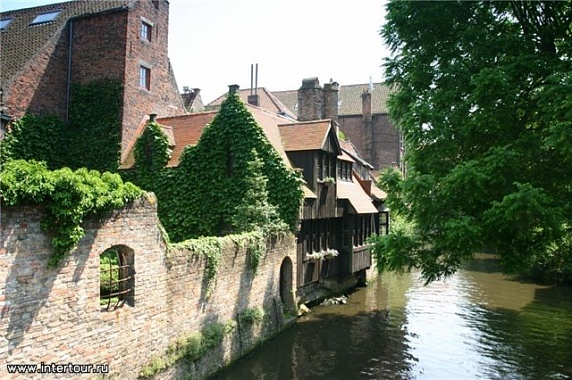 the Kingdom of Belgium
the Kingdom of Belgium
Speech by the Russian Foreign Minister Sergey Lavrov and his answers to questions from the mass media during the press conference summarising the results of the negotiations with the Deputy Prime Minister and Minister of Foreign Affairs of Belgium Didier Reynders, Brussels, 15 October 2013
Ladies and Gentlemen,
I would like to thank my colleague Mr. Didier Reynders for his traditional Belgian hospitality, the perfect organisation of our work and very substantial negotiations. Today's visit has a special meaning: this year we celebrate 160 years since the establishment of diplomatic relations between our countries.
Russia and Belgium are strategic partners and develop intensive, mutually beneficial cooperation in various areas – primarily in the area of economics, investments and high tech. Many leading Belgian companies operate in Russia. Didier Reynders specifically asked their head about the problems they face in Russia. They have no problems. That is good, and we will do everything to make the situation develop in the same way. At the same time, I can say that more and more Russian companies are exploring the Belgian market. They also feel comfortable here.
The absence of problems does not mean that we do not need to promote our cooperation further and make it deeper. These issues will be discussed in detail here in November in the course of the work of another session of the Mixed Commission for Economic Cooperation between the Russian Federation and the Belgium-Luxembourg Economic Union.
We also discussed international problems, primarily relations between Russia and the European Union, Russia and NATO. Our joint purpose with the EU is to further deepen our strategic partnership. First of all, we will try to achieve implementation of the task, which was set long ago – of ensuring freedom of movement, liberalisation and full refusal of any visa requirements during mutual travels of our nationals. Nevertheless, it is important to build up our strategic partnership with the European Union in the area of guaranteeing all aspects of energy security. This dialogue requires steps from both parties for the purpose of finding mutually beneficial and mutually acceptable agreements. We expect that these issues, as well as the preparation of the new basic agreement between Russia and the European Union, and other aspects of our interaction will be reviewed in the context of preparations for the next EU-Russia summit, the deadlines of which are currently being agreed on.
We wish to develop our dialogue with the European Union on the problems of defending and ensuring human rights, on the basis of universal norms and standards approved by the UN, on the basis of Christian values, which match the values of other world religions, and any disruption of which we would like to avoid.
Our negotiations today again confirmed the commonality of the approaches of Russia and Belgium to international and regional problems, mutual interest in their resolution on firm grounds of international law. The criterion of the rule of law must be equally applicable, no matter whether individual interests are being promoted, or groups of countries or persons wish to protect acleanenvironment, or regional conflicts are being resolved.
We are satisfied that we see flashes of hope in connection with the Syrian crisis. They are related to the agreements reached after the accession of Syria to the Chemical Weapons Convention related to the establishment of control and destruction of reserves of poisonous weapons in Syria. This concerns the need to effectively resolve humanitarian problems of the Syrian population – both refugees and internally displaced persons inside Syria, and the removal of all the obstacles, which some circles attempt to artificially create along the way to the creation of the Geneva-2 conference.
We have reliable assessments regarding the prospects of settlement of the situation around Iran's Nuclear Programme, reaching an outcometo the Palestinian-Israeli conflict, developing cooperation in international organisations, including within the framework of the OSCE. In 2010, at the OSCE summit in Astana, a goal was set to form a common space of security, stability and cooperation in the territory of Europe and Eurasia. Today we discussed the most effective ways to advance towards the solution of this task. One of the aspects of our joint work is the implementation of the agreements reached between Russia and the EU in 2004, which consist in ensuring mutual respect for integration processes developing in the West and in the East of the European continent.
We are convinced that it is important to be guided not by these minute market interests, not by the aspiration to return to games "with a zero result", but to see the long-term benefitsof our joint work for the Eurasian and Euro Atlantic areas and to insistently achieve the settlement of all issues related to the creation of a common economic and humanitarian space stretching from Lisbon to Vladivostok, as the President of the Russian Federation Vladimir Putin proposed. Of course, this requires strategic vision, a readiness for tedious and hard work, a search for mutually beneficial compromises. But I am convinced that the result will reap big rewards for Europe and all the countries located in the large Eurasian continent.
As Didier Reynders has said, we have many plans for the future. In 2014 we will hold a series of events dedicated to 100 years since the beginning of the First World War. Russia and Belgium wish to celebrate this date decently – decently in respect of the memories of those who laid down their lives on our joint continent. We will have many opportunities to continue our political dialogue about this and other issues. I am glad to invite Mr. Didier Reynders to visit the Russian Federation next year.
Question: Russia is moving to the forefront in global news in issues related to the development of the situation in Syria, relations between Israel and Palestine. How would you define the changes in the political and diplomatic course of Russia?
Sergey Lavrov: You attempt to look at this situation as if from the outside, superficially. I cannot say that Russia is attempting to move to the forefront always and everywhere to occupy a certain place in the news and on the pages of the newspapers. We attempt to formulate our positions in these or those acute international problems, primarily proceeding from an analysis of the actual state of things and realistic scenarios.
From the very beginning of the Syrian crisis we said that there is no military solution. We were active advocates of convening Geneva-1 and co-authors of the Geneva Communiqué of 30 June 2012;we have always said that we need to take all necessary measures to prevent chemical weapons from falling into the hands of extremists. The fact that more and more countries are starting to share these positions, has allowed us to get things moving in connection with chemical weapons in Syria after its accession to the Chemical Weapons Convention. The Presidents of Russia and the United States agreed to make these propositions, which are currently being implemented with the support of the overwhelming majority of members of the international community, on the side-lines of the G20 summit in St Petersburg.
As to Iran, we said from the very beginning that all the participants in these negotiations must state clearly to Tehran that they do not pursue the goal of overthrowing the regime, but rather want clarification of the problems faced by the IAEA, and after these are clarified, all sanctions and other obstacles to Iran's participation in international life will be removed. It appears that in the current conditions participants in the negotiations have become aware of the importance of using this situation to take such a step and on the basis of it to attempt to settle Iran'snuclear problem. In the cases of Syria and Iran, any successful, satisfactory decision will be collective only.
In the same way, a sustainable Palestine-Israel Peace Process can be achieved only through collective decisions. I am convinced that it is possible only when we comply with the existing international legal framework, including the UN Security Council resolutions, the Madrid principles, the Arab Peace Initiative, and the previous agreements between the parties.
Question (to both ministers): A range of new irritants have emerged in relations between Russia and the European Union of late, starting with disputes around the Eastern Partnership and the November summit and ending with trade and economic disagreements. Do these factors negatively affect the visa dialogue? Can we expect a long-awaited agreement on the easing of the visa regime at the forthcoming EU-Russia summit?
Sergey Lavrov (answers first): I can say that relations between Russia and the European Union have never been easy, not least because the EU is our largest partner in the trade, economic and humanitarian areas, in the area of security, and promotion of unified norms in various fields of life. The closer our cooperation, the more practical issues we have to face and we have to resolve them – this is the only process.
Disputes in the trade and economic area emerge between any country and any of its partners. The European Union has disputes within the framework of the World Trade Organization (WTO) with the United States, and with other countries. Now we are mastering WTO mechanisms, where we aspire to solve the task of stopping anti-dumping procedures of the European Union in respect ofour manufacturers, and resolve other issues. The European Union uses the same mechanisms to settle the problems it is interested in. This is an absolutely natural process, and it will always be so. The main thing is to use international liabilities and international legal documents as a basis, be those WTO norms, agreements between Russia and the European Union, Russia and EU members on the protection and promotion of investments and obligations not to exacerbate business conditions, and many others, on which our relations are based.
Our progress on the visa issue also depends on the implementation of these agreements. According to our experts' estimates, all the agreements at technical and expert level, which were concluded in the area of work on further easing of the visa regime and advancement towards the conclusion of an agreement on a visa free regime, have been implemented. Now we are waiting for a political decision. We will assume that this issue will occupy one of the central positions at the forthcoming EU-Russia summit.
Question: Your colleague informed you that the Parliament of Belgium requested that the Greenpeace activists detained in Murmansk be freed. How would you comment on this?
Sergey Lavrov: My answer is very simple. We should not interfere with the activity of judicial bodies. This situation is subject-matter for the investigation to transfer the case to a court of the Russian Federation. The Netherlands have initiated an arbitration procedure. The case is in the competence of judicial proceedings and we should leave it there.
Russian investigating authorities are convinced that at least three Articles (56, 60, 80) of the United Nations Convention on the Law of the Sea of 1982 have been violated. The authorities of the Netherlands, as the country whose flag the Arctic Sunrise was flying, were warned many times that the ship was planning actions in violation of the above mentioned Convention and Russian legislation on the exclusive economic area. They ignored these warnings. I have nothing to add.








